Politics
Britons are dying in a blizzard of cheap cocaine. Why is so little being done to save them? | Martha Gill
Compared with the screaming scare campaigns of the 1990s, anti-drugs messaging is thin on the ground these days. So the casual observer may not realise that Britain has, quietly but surely, lost its “war on drugs”. Amid a steep rise in drug poisonings, a particularly striking statistic emerged last week. Between 2022 and 2023, cocaine-related deaths in England and Wales soared by 30%. The figure is now around 10 times higher than in 2011.
And that could be an underestimate. There’s often a time lag of two to three years between drug deaths and the coroner’s assessment on which these statistics are based, says Ian Hamilton, associate professor of addiction at the University of York: current rates are probably even higher. What’s more, not all deaths resulting from cocaine are included. The long-term damage that eventually ends in a stroke or a heart attack will not show up in these reports.
What is going on? One culprit is a precipitous rise in purity, which makes it easier to overdose by accident. Once cocaine was sold in a two-tier market: the cheap, heavily adulterated stuff, and the expensive, purer cocaine consumed by models, city traders and members of the Bullingdon Club. Now, according to the latest United Nations Office on Drugs and Crime report, cocaine in Europe has on average a purity of over 60%, compared with 35% in 2009. Today, even street cocaine rivals the top-end stuff of the 1980s.
This may in part be the unintended consequence of government crackdowns on cutting agents such as benzocaine, a dental anaesthetic. But the result is a drug that is often far stronger than users are expecting. This could be particularly true of generation X – now accumulating health issues – which came of age at a time of much milder cocaine: the highest rate of recent deaths in England and Wales is among men aged 40 to 49.
Another factor is price, which, despite inflation, has not budged for years. This is partly because supply is up in producer countries, partly because cocaine has a known street price: raise it, and customers go elsewhere; drop it, and they suspect something is wrong with the product. And if cocaine is better and cheaper, more people try it. A larger pool of users means more with undetected heart issues that a dose of cocaine might suddenly exacerbate.
It also means cocaine is more often mixed with other drugs, rather than consumed reverently, by itself, as a treat. This ramps up the danger. It is now so cheap and prevalent that drinkers use it to temper the effects of alcohol, in order to drink more. And to fill the gap left in the higher end of the market, there are complicated cocktails. Liam Payne, who died this month, had “pink cocaine” in his system: a drug that typically includes methamphetamine, ketamine, MDMA and crack cocaine. According to Harry Sumnall, a professor in substance use at Liverpool John Moores University, about 20% of the recently recorded cocaine deaths were in association with alcohol, and a third involved other drugs.
One important aspect of the death rate comes down not to the drug itself but to human psychology. Cocaine is increasingly normalised. It may be more dangerous than ever, but the more people take it, the more commonplace it seems, and the safer they assume it to be. In this way a vicious cycle is created: once there is a surge in cocaine use, it tends to be perpetuated.
The drug has been normalised into different income brackets, too. It was once known as the yuppie drug, but has since gone through a radical rebrand: it is now found at all levels of society. It is so commonplace at football matches that it supersedes alcohol as a major safety issue on match days – helping to drive disorderly behaviour. A 2019 Home Office survey found that 35% of users were manual workers.
It has also become normal for older people to take cocaine. Traditionally, drug takers tend to give up the habit in their late twenties and early thirties, but a group within generation X is bucking the trend. The reasons are unclear, but it could be because there were more drug users in this generation to start with. “People who started taking drugs in the 1990s realised there weren’t enough police to go around and they were going to get away with it,” says Sumnall. “In the 70s and 80s young people were more scared of being caught.”
What can we do about this mounting death rate? The odd thing about drug problems is how helpless governments tend to be in the face of them – Britain can do very little about the purity and price of cocaine, mostly driven by international factors. Law enforcement only goes so far when people are consuming drugs en masse and mostly in private. And there is scant evidence that dramatic campaigns such as “Just Say No” did anything to deter people from drugs.
There are just two things that might work, says Hamilton. One is harm reduction: at present, treatment centres are mostly set up to help with opiates, and, unlike with heroin and methadone, there are no substitute drugs with which to treat cocaine addicts. There is some evidence, too, that data-driven education, rather than “scare” campaigns, might help break the cycle of normalisation. A recent study found that giving young adults information about how drugs affect the brain, backed up by reputable neuroscientific research, made them less likely to dabble.
after newsletter promotion
But another psychological block stands in the way of all this, which is that people tend to be reluctant to spend money to help drug users. In the 1980s, taxpayers were persuaded to fund harm-reduction programmes only because injecting heroin was associated with the wider spread of HIV. Then, under Tony Blair, spending on drug treatment was framed as a means to reduce crime. Can today’s voters be convinced that it is worth helping coke-addled 40-year-olds not to die?
We need to shift the mindset of cocaine users. But to do so we must shift our own. That may be harder than it seems.
Martha Gill is an Observer columnist
Politics
How UK is preparing for new US president

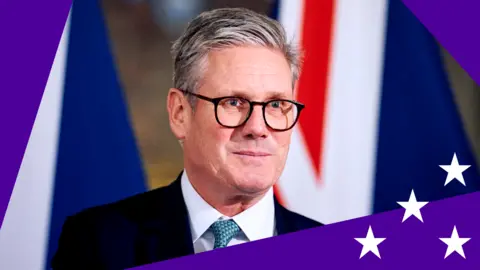 Reuters
Reuters“To everyone’s astonishment, the vulgar insurgent has won!”
So wrote a British foreign minister in his diaries on 9 November 2016 after Donald Trump unexpectedly beat Hillary Clinton to the White House.
“This looked remarkably like an abuse of power.”
So wrote the then prime minister in her memoirs after waking up to realise that a Trump-led Washington had said US troops would be pulled out of the fight against the Islamic State group in Iraq and Syria “without any reference to the UK and other nations whose troops were operating alongside them”.
Sir Alan Duncan and Theresa May are the authors of these remarks which the present prime minister, Sir Keir Starmer, would do well to note as he ponders what difference a Trump or Kamala Harris presidency could make to the so-called special relationship between the UK and the US.
“Dealing with Donald Trump and his administration was like dealing with no other world leader,” writes the now Lady May in her book reflecting on her career.
“He was an American president like no other.”
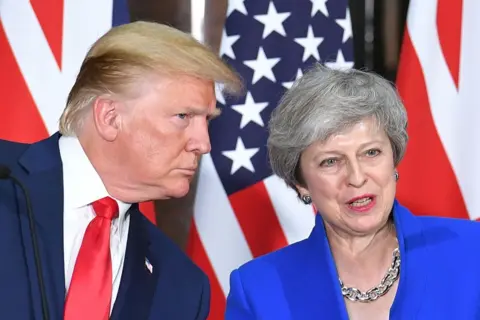 AFP
AFPThere will be challenges, too, if the Democratic vice-president wins. She has yet to meet Sir Keir and has shown limited affinity for Europe – but she will be a vastly more conventional president than her rival.
On the off-chance that Sir Keir thought things might be different this time if Trump wins next week, the last few days showed him otherwise.
The accusation of election interference made by the Trump campaign, courtesy of an, at best, foolishly written LinkedIn post blew up into a transatlantic spat.
“This needs to be seen for what it is. It’s happened every election, every political party does it,” Sir Keir told me, in reference to people volunteering to work for one side or the other in American elections.
But the difference was obvious. On previous occasions it hasn’t caused an almighty row.
It was a reminder that Team Trump can be brash, unpredictable and have a long memory for perceived slights – and don’t appear to really give a stuff about their relationship with the British government.
What on earth might happen to the UK’s most cherished overseas partnership if he wins?
Until the row in the past week, things had, on the face of it, been going well for the new prime minister and US relations.
A few weeks ago Sir Keir and Foreign Secretary David Lammy were in New York to meet the former president, with me accompanying them.
Teetering on a pavement on Fifth Avenue with the 58-storey Trump Tower behind me, we were trying to perfect the angle for broadcast so the garish gold lettering spelling out “TRUMP TOWER” was visible to viewers, even if a giant lorry barrelled down the road as I started talking.
I think we managed it. But a similar balancing act faced the two men – they were in New York for the United Nations General Assembly but much of the chat on the trip was not about them meeting one of the world leaders present but whether they could get time with a candidate hoping to become one, Donald Trump.
And they did get that meeting – which tells you rather a lot about the work British diplomats in America and London have been putting in and the determination of Sir Keir and Mr Lammy to build bridges with the man who may be president again before long.
The prime minister later told me on BBC’s Newscast that “we both wanted to ensure we have a good relationship”.
“It’s up to me as prime minister to make sure I have a good relationship with whoever the president is,” he said.
“I believe strongly in personal relations. Have the ability to, as necessary, pick up the phone to them to sort out issues or talk about issues. So it was a good dinner and I’m really glad that we managed to do it.”
Glad, no doubt at least in part, because of the buckets full of disobliging quotes there are about Trump, not least from David Lammy, who once described his host as a “woman-hating, neo-Nazi-sympathising sociopath” and a “tyrant in a toupee”.
There are no shortage of verbal skeletons in Labour’s cupboard about the man who could soon be back in the Oval Office.
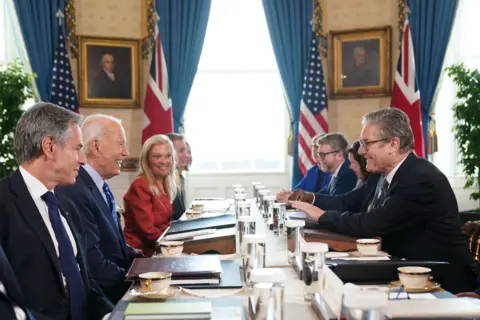 PA
PAIn policy terms, a Trump presidency would likely bring rapid change – on climate change, on international trade (whacking up import taxes, tariffs) and on Ukraine.
Unlike a Harris administration, they would likely offer the UK a free trade deal, but it seems unlikely the terms of it would tempt London to sign up.
So what of Trump’s Democratic rival, the vice-president Kamala Harris?
Diplomatic niceties suggest if you meet one candidate in a foreign election contest, you meet the other one too.
But that isn’t likely to happen with Harris, despite Sir Keir visiting America three times since July.
No 10 blames the pressures on the vice-president’s diary in an election campaign.

It is worth stating the obvious too – while Sir Keir and Harris have never met, she is a vastly more known quantity and far more likely to be conventional in her approach to high office than her rival.
And Sir Keir has gone out of his way to spend a lot of time with President Biden in the last four months, including two trips to the White House and a recent meeting in Berlin.
An imperfect way of getting a sense of how his vice-president might govern – and with no opportunity to build a personal relationship – but not entirely useless at getting something of a handle on it.
Oh and it is worth making a very big picture point too – whoever wins. Increasingly, America’s focus is on the rise of the east and in particular China. Europe matters less to Washington than it did and that holds true whatever the result.
And so Westminster and the world awaits.
Whatever happens, expect the conversation to quickly turn to if and when the prime minister gets an early invite to Washington in the new year.
There will be a queue of leaders heading to the White House.
And what about a state visit to the UK – as Donald Trump revelled in, in 2019 – for a returning president like no other or for America’s first woman president?
Let’s see.

Between now and the US election on 5 November, BBC correspondents around the world are exploring the impact its outcome could have where they are, and what people around the globe make of this White House race.
Politics
Working people know who they are
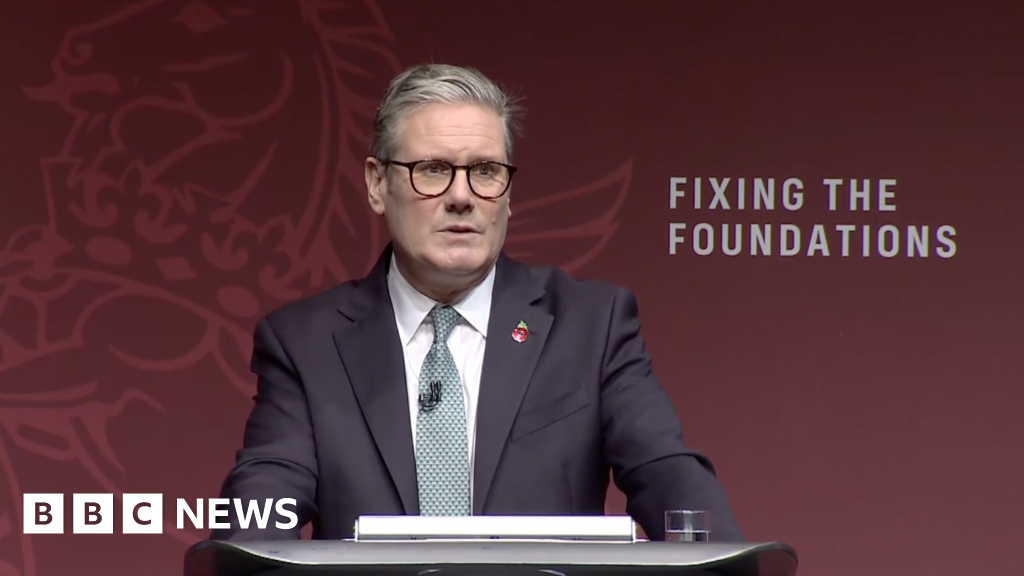
The prime minister says “working people know exactly who they are” in a speech ahead of the Budget.
Speaking in the West Midlands, Sir Keir Starmer stressed that working people are the “golden thread” that runs through his government’s agenda.
On Wednesday, Chancellor Rachel Reeves will deliver Labour’s first Budget for 14 years.
Politics
PM to warn of ‘harsh light’ of reality ahead in Budget
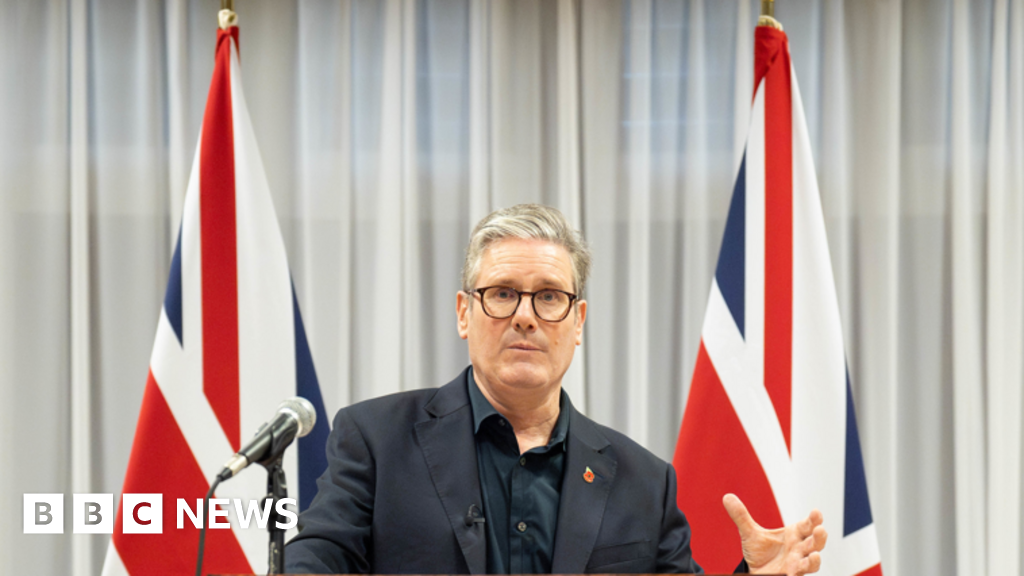
The Budget will embrace the “harsh light of fiscal reality” but “better days are ahead”, Sir Keir Starmer will say in a speech ahead of Wednesday’s announcement.
The prime minister is expected to warn of “unprecedented” economic challenges but will say the government will “run towards them” as Labour prepares for its first Budget in almost 15 years.
The government is expected to announce a series of expected tax hikes, including a rise in the National Insurance (NICs) rate paid by employers which some claim breaks Labour’s manifesto pledge not to increase taxes for “working people”.
The Conservatives have accused Sir Keir of running a government of “broken promises”.
At a speech in the West Midlands on Monday, Sir Keir will argue that the country faces an “unprecedented” challenge of weak public finances alongside “crumbling public services”.
He will promise to face what he calls “the tough decisions”.
Speculation has been growing about the tax rises the chancellor will announce on Wednesday, with Rachel Reeves claiming there is a £22bn “hole” in the public finances left by the previous government.
Last week, Reeves signalled that businesses would face an increase in National Insurance, when she said Labour’s election pledge not to increase contributions on “working people” related to the staff element, as opposed to the sum paid by employers.
Other than National Insurance for employers, the freezing of income tax thresholds could be extended.
This means more people are “dragged” into paying tax or paying a higher rate and wages rise and cross the thresholds.
The government is also looking at increasing tax on asset sales, such as shares and property, as well as changing its own self-imposed rules on how its debts are measured in order to free up money for spending on infrastructure projects.
Politics
Labour MP Mike Amesbury filmed punching man to the ground in Cheshire | Labour
Footage has emerged of a Labour MP punching a man to the ground and then hitting him several more times.
A video published by the Mail shows Mike Amesbury, the MP for Runcorn and Helsby, hitting the man in the face and knocking him to the floor, before standing over him and aiming six more blows at his head.
The security camera footage also shows Amesbury shouting: “You won’t threaten me again, will you?”
Amesbury said in a statement on Saturday night: “Last night I was involved in an incident that took place after I felt threatened on the street following an evening with friends. This morning I contacted Cheshire police myself to report what happened during this incident.
“I will not be making further comment but will, of course, cooperate with any inquiries if required by Cheshire police.”
After an initial video showing the aftermath of the altercation was published on Saturday night, a Labour spokesperson said: “We are aware of an incident that took place last night. We understand that Mike Amesbury MP approached Cheshire police to report what happened this morning himself and that he will cooperate with any inquiries they have.”
The education secretary, Bridget Phillipson, refused to say on Sunday whether Amesbury would have the whip suspended while police investigated.
“Mike Amesbury is cooperating fully with the police,” she said. “He’s gone forward himself to the police, and it is right that the police now look into this matter, investigate and decide what action, if any, is required.”
Officials did not respond on Sunday after footage emerged of the incident.
Cheshire constabulary said in a statement: “At 2.48am on Saturday 26 October, police were called to reports of an assault in Frodsham. A caller reported he had been assaulted by a man in Main Street. Enquiries are ongoing.”
after newsletter promotion
The footage shows Amesbury talking to the man at 2.15am in the Cheshire town of Frodsham. Shortly after the man looks away, Amesbury punches him with enough force to knock him to the ground, before standing over him and hitting him repeatedly as a third man tries to prise him away.
Amesbury was a shadow minister in the housing department before the election but was not given a government job after the party came to power. He won his seat with a majority of nearly 15,000 ahead of the second-placed party, Reform UK.
Politics
Labour backbenchers accuse Keir Starmer of ‘colonial mindset’ | Labour
Three prominent Labour backbenchers have accused Keir Starmer of an “insulting” and “colonial mindset” over his reluctance to discuss reparations for the transatlantic slave trade.
Ahead of a summit of the Commonwealth heads of government in Samoa last week, the prime minister rejected calls to discuss reparations with Caribbean and African nations, with No 10 insisting it was “not on the agenda”.
Starmer said slavery was “abhorrent” but his stance was “looking forward rather than looking backwards”, adding that he wanted to focus on discussing “current future-facing challenges” at the summit instead of “very long, endless discussions about reparations on the past”.
On Sunday the Labour MP Bell Ribeiro-Addy addressed a cross-party reparations conference in London, saying it was “very insulting [to] tell people of African descent to forget and move forward”.
“Reparations are not about relitigating historic injustices, they are about remedying the deep-rooted inequalities that still shape our world today,” she said. “At a time when there is growing awareness of how racial hierarchies that endure to this day were constituted to justify the enslavement and colonisation of African peoples, state-led action on reparations is sadly lacking.”
Another Labour MP, Clive Lewis, said it was surprising Starmer had thought he could take a “colonial mindset” to the summit and “dictate what could and could not be discussed”.
Diane Abbott, the first Black woman to become an MP, co-chaired the conference in London. She said the Labour party previously had plans to establish a national reparations commission but Starmer “seems to have forgotten that”.
“Reparations isn’t about the past, it is about the here and now,” she said. “The descendants of African slaves and colonised peoples continue to suffer from the consequences generations later.
“Real reparations aren’t just about compensation, they’re a way of tackling colonialism’s damaging legacy of racism and inequality. They are about the total system change and repair needed to heal, empower and restore dignity.”
At the conclusion of the Commonwealth heads of government meeting (Chogm), the leaders resolved that “the time has come” for a conversation on reparatory justice.
A document signed by the 56 leaders, including Starmer, stated it was time for a “meaningful, truthful and respectful conversation” about justice for the transatlantic trade in enslaved Africans and chattel enslavement, with the aim of forging “a common future based on equity”.
Ribeiro-Addy, who chairs the all-party parliamentary group for Afrikan Representation, said: “I’m very proud those nations refused to be silenced.”
In a press conference after the summit, Starmer downplayed the significance of the paragraph in the document that called for a conversation about reparatory justice, telling reporters it was a small part of “quite a long communique”.
“None of the discussions have been about money. Our position is very, very clear in relation to that,” he said. He added that the issue would be revisited when a delegation of Caribbean nations visits the UK next year.
Last week, amid mounting pressure, a source in No 10 told the Guardian that the UK could support some forms of reparatory justice, such as restructuring financial institutions and providing debt relief.
“There is a general sense that these multilateral institutions give out loans to developing countries then charge large interest rates for repayments,” the source said.
Politics
CCTV appears to show Labour MP punching man to the ground
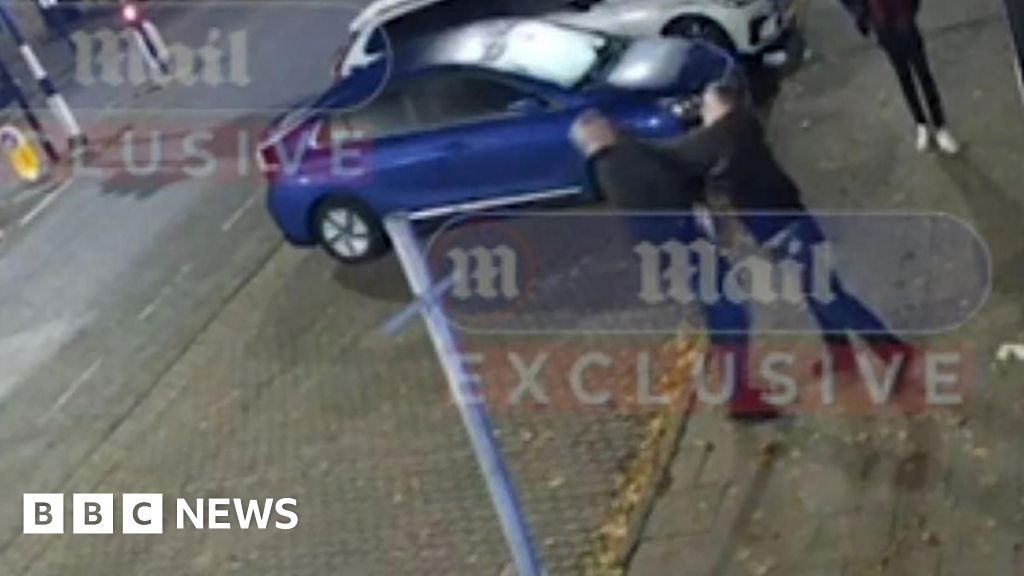
CCTV footage has emerged appearing to show Labour MP Mike Amesbury punching a man to the ground.
In footage obtained by the Daily Mail, the Runcorn and Helsby MP is apparently seen continuing to hit the man as he lies in the street.
It comes after a different video, posted on X, purported to show Amesbury shouting and swearing at the man lying in the street in Frodsham, Cheshire.
In that clip, Amesbury can be heard shouting: “You won’t threaten the MP ever again, will you?”
Both Amesbury and the Labour Party have been contacted for their response.
It is not clear what happened in the build-up to the moments caught on film.
In a statement issued before the Daily Mail footage emerged, Cheshire Police said: “At 02:48 BST on Saturday 26 October police were called to reports of an assault in Frodsham.
“A caller reported he had been assaulted by a man in Main Street. Enquiries are ongoing.”
Posting on his own Facebook page on Saturday, the 55-year-old backbencher said: “Last night I was involved in an incident that took place after I felt threatened following an evening out with friends.
“This morning I contacted Cheshire Police myself to report what happened.
“I will not be making any further public comment but will of course cooperate with any inquiries if required by Cheshire Police.”
Amesbury has been a Labour MP in Cheshire since 2017 and served as a shadow minister between 2018 and 2024.
In the July general election he won his constituency with a majority of 14,696.
-

 Technology1 month ago
Technology1 month agoIs sharing your smartphone PIN part of a healthy relationship?
-

 Science & Environment1 month ago
Science & Environment1 month agoHow to unsnarl a tangle of threads, according to physics
-

 Science & Environment1 month ago
Science & Environment1 month agoHyperelastic gel is one of the stretchiest materials known to science
-

 Science & Environment1 month ago
Science & Environment1 month ago‘Running of the bulls’ festival crowds move like charged particles
-

 Science & Environment1 month ago
Science & Environment1 month agoMaxwell’s demon charges quantum batteries inside of a quantum computer
-

 Technology1 month ago
Technology1 month agoWould-be reality TV contestants ‘not looking real’
-

 Science & Environment1 month ago
Science & Environment1 month agoX-rays reveal half-billion-year-old insect ancestor
-

 Science & Environment1 month ago
Science & Environment1 month agoSunlight-trapping device can generate temperatures over 1000°C
-

 Technology4 weeks ago
Technology4 weeks agoUkraine is using AI to manage the removal of Russian landmines
-

 Science & Environment1 month ago
Science & Environment1 month agoLiquid crystals could improve quantum communication devices
-

 TV4 weeks ago
TV4 weeks agoসারাদেশে দিনব্যাপী বৃষ্টির পূর্বাভাস; সমুদ্রবন্দরে ৩ নম্বর সংকেত | Weather Today | Jamuna TV
-

 Technology3 weeks ago
Technology3 weeks agoSamsung Passkeys will work with Samsung’s smart home devices
-

 Sport4 weeks ago
Sport4 weeks agoBoxing: World champion Nick Ball set for Liverpool homecoming against Ronny Rios
-

 Science & Environment1 month ago
Science & Environment1 month agoQuantum ‘supersolid’ matter stirred using magnets
-

 Science & Environment1 month ago
Science & Environment1 month agoLaser helps turn an electron into a coil of mass and charge
-

 Science & Environment1 month ago
Science & Environment1 month agoPhysicists have worked out how to melt any material
-

 Football4 weeks ago
Football4 weeks agoRangers & Celtic ready for first SWPL derby showdown
-

 News3 weeks ago
News3 weeks agoMassive blasts in Beirut after renewed Israeli air strikes
-

 Science & Environment1 month ago
Science & Environment1 month agoA new kind of experiment at the Large Hadron Collider could unravel quantum reality
-

 News3 weeks ago
News3 weeks agoNavigating the News Void: Opportunities for Revitalization
-

 MMA3 weeks ago
MMA3 weeks ago‘Uncrowned queen’ Kayla Harrison tastes blood, wants UFC title run
-

 MMA4 weeks ago
MMA4 weeks agoDana White’s Contender Series 74 recap, analysis, winner grades
-

 Technology4 weeks ago
Technology4 weeks agoGmail gets redesigned summary cards with more data & features
-

 MMA4 weeks ago
MMA4 weeks agoPereira vs. Rountree prediction: Champ chases legend status
-

 News3 weeks ago
News3 weeks ago‘Blacks for Trump’ and Pennsylvania progressives play for undecided voters
-

 Business3 weeks ago
Business3 weeks agoWhen to tip and when not to tip
-

 News3 weeks ago
News3 weeks ago▶ Hamas Spent $1B on Tunnels Instead of Investing in a Future for Gaza’s People
-

 Football4 weeks ago
Football4 weeks agoWhy does Prince William support Aston Villa?
-

 Sport3 weeks ago
Sport3 weeks agoAaron Ramsdale: Southampton goalkeeper left Arsenal for more game time
-

 Technology1 month ago
Technology1 month agoRussia is building ground-based kamikaze robots out of old hoverboards
-

 Womens Workouts1 month ago
Womens Workouts1 month ago3 Day Full Body Women’s Dumbbell Only Workout
-

 Technology4 weeks ago
Technology4 weeks agoMicrophone made of atom-thick graphene could be used in smartphones
-

 Technology4 weeks ago
Technology4 weeks agoMusk faces SEC questions over X takeover
-

 Sport3 weeks ago
Sport3 weeks agoWales fall to second loss of WXV against Italy
-

 Sport3 weeks ago
Sport3 weeks agoMan City ask for Premier League season to be DELAYED as Pep Guardiola escalates fixture pile-up row
-

 Science & Environment1 month ago
Science & Environment1 month agoWhy this is a golden age for life to thrive across the universe
-

 Technology4 weeks ago
Technology4 weeks agoEpic Games CEO Tim Sweeney renews blast at ‘gatekeeper’ platform owners
-
Business4 weeks ago
DoJ accuses Donald Trump of ‘private criminal effort’ to overturn 2020 election
-

 News4 weeks ago
News4 weeks agoWoman who died of cancer ‘was misdiagnosed on phone call with GP’
-

 Technology4 weeks ago
Technology4 weeks agoMicrosoft just dropped Drasi, and it could change how we handle big data
-

 Money3 weeks ago
Money3 weeks agoWetherspoons issues update on closures – see the full list of five still at risk and 26 gone for good
-

 MMA3 weeks ago
MMA3 weeks agoKetlen Vieira vs. Kayla Harrison pick, start time, odds: UFC 307
-

 Sport3 weeks ago
Sport3 weeks ago2024 ICC Women’s T20 World Cup: Pakistan beat Sri Lanka
-

 Science & Environment1 month ago
Science & Environment1 month agoQuantum forces used to automatically assemble tiny device
-

 Science & Environment1 month ago
Science & Environment1 month agoA slight curve helps rocks make the biggest splash
-

 Science & Environment1 month ago
Science & Environment1 month agoNuclear fusion experiment overcomes two key operating hurdles
-

 News1 month ago
News1 month ago▶️ Hamas in the West Bank: Rising Support and Deadly Attacks You Might Not Know About
-

 Technology1 month ago
Technology1 month agoMeta has a major opportunity to win the AI hardware race
-

 Science & Environment1 month ago
Science & Environment1 month agoITER: Is the world’s biggest fusion experiment dead after new delay to 2035?
-

 Technology1 month ago
Technology1 month agoWhy Machines Learn: A clever primer makes sense of what makes AI possible
-

 Sport4 weeks ago
Sport4 weeks agoChina Open: Carlos Alcaraz recovers to beat Jannik Sinner in dramatic final
-

 Sport4 weeks ago
Sport4 weeks agoSturm Graz: How Austrians ended Red Bull’s title dominance
-

 MMA3 weeks ago
MMA3 weeks ago‘I was fighting on automatic pilot’ at UFC 306
-

 Entertainment3 weeks ago
Entertainment3 weeks agoNew documentary explores actor Christopher Reeve’s life and legacy
-

 News4 weeks ago
News4 weeks agoRwanda restricts funeral sizes following outbreak
-

 Technology4 weeks ago
Technology4 weeks agoThis AI video generator can melt, crush, blow up, or turn anything into cake
-
Business4 weeks ago
Sterling slides after Bailey says BoE could be ‘a bit more aggressive’ on rates
-

 News4 weeks ago
News4 weeks agoCornell is about to deport a student over Palestine activism
-

 News3 weeks ago
News3 weeks agoFamily plans to honor hurricane victim using logs from fallen tree that killed him
-

 Technology3 weeks ago
Technology3 weeks agoThe best budget robot vacuums for 2024
-

 Sport3 weeks ago
Sport3 weeks agoCoco Gauff stages superb comeback to reach China Open final
-

 Science & Environment1 month ago
Science & Environment1 month agoNerve fibres in the brain could generate quantum entanglement
-

 MMA4 weeks ago
MMA4 weeks agoJulianna Peña trashes Raquel Pennington’s behavior as champ
-

 News4 weeks ago
News4 weeks agoGerman Car Company Declares Bankruptcy – 200 Employees Lose Their Jobs
-

 Technology3 weeks ago
Technology3 weeks agoCheck, Remote, and Gusto discuss the future of work at Disrupt 2024
-

 News3 weeks ago
News3 weeks agoHull KR 10-8 Warrington Wolves – Robins reach first Super League Grand Final
-
Business3 weeks ago
The search for Japan’s ‘lost’ art
-

 Business4 weeks ago
Business4 weeks agoStocks Tumble in Japan After Party’s Election of New Prime Minister
-
Business4 weeks ago
Bank of England warns of ‘future stress’ from hedge fund bets against US Treasuries
-

 Business4 weeks ago
Business4 weeks agoChancellor Rachel Reeves says she needs to raise £20bn. How might she do it?
-

 Technology3 weeks ago
Technology3 weeks agoTexas is suing TikTok for allegedly violating its new child privacy law
-

 Science & Environment1 month ago
Science & Environment1 month agoTime travel sci-fi novel is a rip-roaringly good thought experiment
-

 Science & Environment1 month ago
Science & Environment1 month agoHow to wrap your mind around the real multiverse
-

 News1 month ago
News1 month ago▶️ Media Bias: How They Spin Attack on Hezbollah and Ignore the Reality
-

 MMA3 weeks ago
MMA3 weeks agoKayla Harrison gets involved in nasty war of words with Julianna Pena and Ketlen Vieira
-

 Health & fitness4 weeks ago
Health & fitness4 weeks agoNHS surgeon who couldn’t find his scalpel cut patient’s chest open with the penknife he used to slice up his lunch
-

 Technology3 weeks ago
Technology3 weeks agoThe best shows on Max (formerly HBO Max) right now
-

 Technology3 weeks ago
Technology3 weeks agoIf you’ve ever considered smart glasses, this Amazon deal is for you
-

 Sport4 weeks ago
Sport4 weeks agoWorld’s sexiest referee Claudia Romani shows off incredible figure in animal print bikini on South Beach
-

 Football4 weeks ago
Football4 weeks agoSimo Valakari: New St Johnstone boss says Scotland special in his heart
-

 Technology4 weeks ago
Technology4 weeks agoJ.B. Hunt and UP.Labs launch venture lab to build logistics startups
-

 MMA3 weeks ago
MMA3 weeks agoUFC 307 preview show: Will Alex Pereira’s wild ride continue, or does Khalil Rountree shock the world?
-
Business3 weeks ago
Head of UK Competition Appeal Tribunal to step down after rebuke for serious misconduct
-

 Business3 weeks ago
Business3 weeks agoStark difference in UK and Ireland’s budgets
-

 MMA3 weeks ago
MMA3 weeks agoPereira vs. Rountree preview show live stream
-

 MMA3 weeks ago
MMA3 weeks ago‘Dirt decision’: Conor McGregor, pros react to Jose Aldo’s razor-thin loss at UFC 307
-
Business4 weeks ago
how UniCredit built its Commerzbank stake
-

 Science & Environment4 weeks ago
Science & Environment4 weeks agoMarkets watch for dangers of further escalation
-

 Technology3 weeks ago
Technology3 weeks agoApple iPhone 16 Plus vs Samsung Galaxy S24+
-
Politics4 weeks ago
Rosie Duffield’s savage departure raises difficult questions for Keir Starmer. He’d be foolish to ignore them | Gaby Hinsliff
-

 Technology3 weeks ago
Technology3 weeks agoOpenAI secured more billions, but there’s still capital left for other startups
-

 Money3 weeks ago
Money3 weeks agoPub selling Britain’s ‘CHEAPEST’ pints for just £2.60 – but you’ll have to follow super-strict rules to get in
-

 Sport4 weeks ago
Sport4 weeks agoPremiership Women’s Rugby: Exeter Chiefs boss unhappy with WXV clash
-

 News1 month ago
News1 month agoOur millionaire neighbour blocks us from using public footpath & screams at us in street.. it’s like living in a WARZONE – WordupNews
-

 MMA4 weeks ago
MMA4 weeks agoAlex Pereira faces ‘trap game’ vs. Khalil Rountree
-

 News4 weeks ago
News4 weeks agoLiverpool secure win over Bologna on a night that shows this format might work
-

 Technology4 weeks ago
Technology4 weeks agoAmazon’s Ring just doubled the price of its alarm monitoring service for grandfathered customers
-

 Money3 weeks ago
Money3 weeks agoAll the key dates for Christmas to save you money including £4 chocs and 25% off Disney
-

 TV3 weeks ago
TV3 weeks agoLove Island star sparks feud rumours as one Islander is missing from glam girls’ night
-

 TV4 weeks ago
TV4 weeks agoPhillip Schofield accidentally sets his camp on FIRE after using emergency radio to Channel 5 crew


You must be logged in to post a comment Login